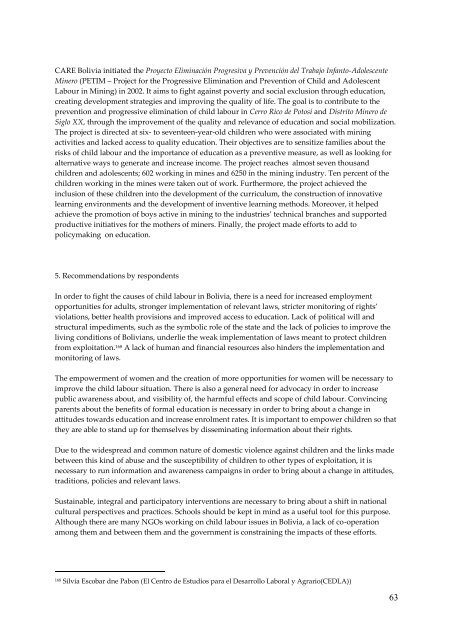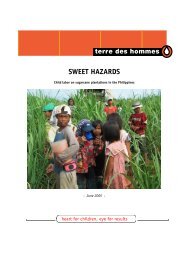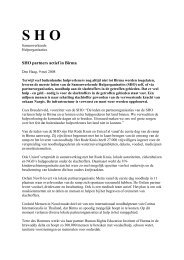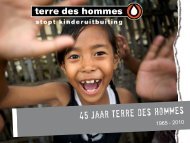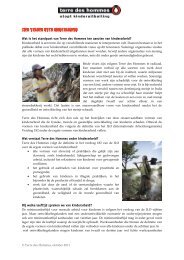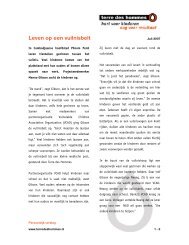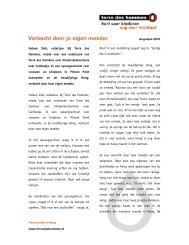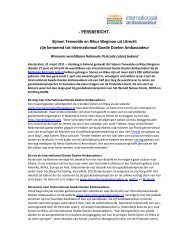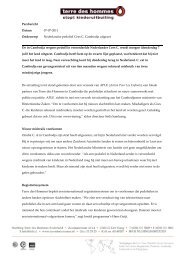Untitled - Terre des Hommes
Untitled - Terre des Hommes
Untitled - Terre des Hommes
- No tags were found...
You also want an ePaper? Increase the reach of your titles
YUMPU automatically turns print PDFs into web optimized ePapers that Google loves.
CARE Bolivia initiated the Proyecto Eliminación Progresiva y Prevención del Trabajo Infanto-Adolescente<br />
Minero (PETIM – Project for the Progressive Elimination and Prevention of Child and Adolescent<br />
Labour in Mining) in 2002. It aims to fight against poverty and social exclusion through education,<br />
creating development strategies and improving the quality of life. The goal is to contribute to the<br />
prevention and progressive elimination of child labour in Cerro Rico de Potosí and Distrito Minero de<br />
Siglo XX, through the improvement of the quality and relevance of education and social mobilization.<br />
The project is directed at six- to seventeen-year-old children who were associated with mining<br />
activities and lacked access to quality education. Their objectives are to sensitize families about the<br />
risks of child labour and the importance of education as a preventive measure, as well as looking for<br />
alternative ways to generate and increase income. The project reaches almost seven thousand<br />
children and adolescents; 602 working in mines and 6250 in the mining industry. Ten percent of the<br />
children working in the mines were taken out of work. Furthermore, the project achieved the<br />
inclusion of these children into the development of the curriculum, the construction of innovative<br />
learning environments and the development of inventive learning methods. Moreover, it helped<br />
achieve the promotion of boys active in mining to the industries’ technical branches and supported<br />
productive initiatives for the mothers of miners. Finally, the project made efforts to add to<br />
policymaking on education.<br />
5. Recommendations by respondents<br />
In order to fight the causes of child labour in Bolivia, there is a need for increased employment<br />
opportunities for adults, stronger implementation of relevant laws, stricter monitoring of rights’<br />
violations, better health provisions and improved access to education. Lack of political will and<br />
structural impediments, such as the symbolic role of the state and the lack of policies to improve the<br />
living conditions of Bolivians, underlie the weak implementation of laws meant to protect children<br />
from exploitation. 168 A lack of human and financial resources also hinders the implementation and<br />
monitoring of laws.<br />
The empowerment of women and the creation of more opportunities for women will be necessary to<br />
improve the child labour situation. There is also a general need for advocacy in order to increase<br />
public awareness about, and visibility of, the harmful effects and scope of child labour. Convincing<br />
parents about the benefits of formal education is necessary in order to bring about a change in<br />
attitu<strong>des</strong> towards education and increase enrolment rates. It is important to empower children so that<br />
they are able to stand up for themselves by disseminating information about their rights.<br />
Due to the wi<strong>des</strong>pread and common nature of domestic violence against children and the links made<br />
between this kind of abuse and the susceptibility of children to other types of exploitation, it is<br />
necessary to run information and awareness campaigns in order to bring about a change in attitu<strong>des</strong>,<br />
traditions, policies and relevant laws.<br />
Sustainable, integral and participatory interventions are necessary to bring about a shift in national<br />
cultural perspectives and practices. Schools should be kept in mind as a useful tool for this purpose.<br />
Although there are many NGOs working on child labour issues in Bolivia, a lack of co-operation<br />
among them and between them and the government is constraining the impacts of these efforts.<br />
168<br />
Silvia Escobar dne Pabon (El Centro de Estudios para el Desarrollo Laboral y Agrario(CEDLA))<br />
63


